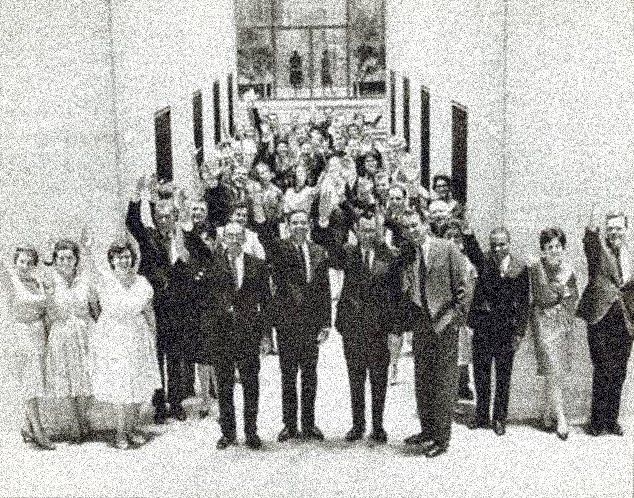The Competitive Personality
Mills's classic essay on the "alert, obsequious instrument" of the competitive personality.

“The Competitive Personality,” published in Partisan Review in the fall of 1946, contains C. Wright Mill’s discussion of a new type of worker, a sort of mutation of the white-collar employee about which Mills would later publish a groundbreaking sociological study. The competitive personality demonstrates how changes in competitive relationships within the corporatized and bureaucratized structure of “monopoly capitalism” produce corresponding alterations in individual personality and behavior, making the work a pivotal piece of analytic social psychology. With its emphasis on a new, precarious form of worker, who must find a way to survive on the periphery of a number of different institutions at the same time, it provides a striking early formulation of what today would fall under the heading of the so-called gig economy.
Reprinted with the kind permission of the C. Wright Mills Trust. Originally Published in Partisan Review, Vol. 13 No. 4, September-October 1946.
I.
For liberals, competition has never been merely an impersonal mechanism regulating the economy of capitalism. It has been a guarantee of political freedom, a system for producing free individuals, and a testing field for heroes. These have been the alibis of liberals for the hurt that competition has caused the people ground between the big sharp edges of its workings.
In every area of life, liberals have imagined independent individuals freely competing so that merit might win and character develop: in the free contractual marriage, the protestant church, the voluntary association, the democratic state, as well as on the economic market. Competition is the way liberalism would integrate its historical era; it is also the central feature of liberalism’s style of life.
The hero of liberalism has exemplified the ways of competition in every sphere of life, but it was in the economic sphere that his merit came out most clearly, and it was by virtue of his business career that he attained power and glory and even the legendary purity of which heroes are made.
As the worlds of monopoly spread out their grasp, the classic exemplar of liberalism, the old captain of industry, took on, at least in his cruder images, a somewhat bloated and overbearing shape. By the twentieth century he had been replaced in his business world by other types of economic men, among them the industrial rentier and the corporation executive, the little business and white collar men, as well as a type we shall presently describe as the new entrepreneur. None of these have successfully filled the heroic place of the old, undivided captain of industry.
The public image of the rentier is not that of a productively competitive man; he is either the stealthy miser or the lavish consumer. He doesn’t live the business-wise life of competition, and even the liberal economists dislike his economic role. The corporation executive has never been a popular middle-class idol; he is too cold and high with impersonal power. On the engineering side, he is part of the inexorable Science, and no economic hero; and on the business side, he is correctly seen as part of the big finance.
It was the little man of business, with all his engaging human characteristics, who became the hero of liberalism in the early twentieth century. He has been seen as the somewhat woebegone inheritor of the old captain’s tradition, even if only by default. The harder his struggle has become, the more sympathetic and the more heroized his image has been drawn; yet his plight has been a sad one, for he cannot live up to the heritage by which he is burdened.
The laws and planning of the Progressive Era, the muck-raking, the square deals and new freedoms were, at least verbally, attempts to buck up the little businessman, that he might better live up to the carefully presented image of him. Much of the New Deal was dealt in his honor, lest he become a forgotten man. And in the decade after 1933, he became even more officially the hero of the liberal system; no less than 390 bills in his behalf were introduced for consideration by the Congress.
The Monographs and Hearings of the Temporary National Committee are the last great scholarly and official monument to liberalism’s little hero. Like other large attempts in behalf of things as they are imagined or hoped to be, the TNEC fetishizes competition and heroizes little business. But it does so under an enormous burden of fact. Only the necessary screen of political rhetoric, the peculiar structure of political representation, and the myopia induced by small-town life has kept this senatorial fetish and this heroic image alive. Now that the TNEC is well buried by war, we may treat it as a symbol, having positive as well as negative references. For underneath its rhetoric and resting on its facts, we may discern the present role of competition as well as some new types of economic men and women, who are living a new competitive life in the age of corporate bureaucracy.
What the million dollars’ worth of TNEC facts demonstrate, no matter how they are arranged, is the detailed accuracy of Veblen’s remark that competition is by no means dead, only now it is chiefly “competition between the businessman who controls production, on the one side, and the consuming public, on the other side; the chief expedient in this business-like competition being salesmanship and sabotage.” What the TNEC documents was already well supposed, but now the documentation is directly from the mouths of the men who run things. In telling of the manner in which competition has been hedged in by giant corporations, and by groups of smaller corporations acting collectively, they have made clear the locus of the big competition and the masklike character of liberalism’s rhetoric.
Yet for the benefit of their imaginary hero, the senators, and their experts, have persisted in fetishizing this mask of big business. They have proposed that the good old captains of industry be given a rebirth with the full benefit of governmental midwifery.
Charles Beard has remarked that this proposal resembles not a mouse creeping out of a mountain of fact but a mere squeak. Yet it remains the best that the official liberal has to say about economic facts of life. In continuing to see competition as salvation from complicated trouble, the priestlike senators in charge of the ceremony naturally fall into the old petty-bourgeois complaints; and the experts, perhaps for the record, fall in with senators. Now they are together in the big volumes with their thin little wisdom. But their wisdom is nostalgic, and their offerings are dwarfed by the great facts of the modern economy. Their mood ought to be the mood of plight, but they have succeeded in setting up a bright image of the little businessman, who could be rehabilitated as the hero of their system, if only competition were once more to prevail.
II.
This liberal hero, the little businessman, has a tendency to forget the senatorial rhetoric put out in his behalf; he doesn’t seem to want to develop his character by free and open competition. Last year in six middle-sized cities, arbitrarily selected samples of little businessmen were asked if they thought “free competition was by and large a good thing.” With authority and vehemence they all answered, Yes, of course, what do you mean? Then they were asked, “Here in this, your town?” Yes, they said, but now hesitating a little. Finally: “How about here in this town in furniture, or groceries (or whatever the man’s specific line was)? Their answers were of two sorts: Yes, if it’s fair competition, which turned out to mean something very simple and understandable: If it doesn’t make me compete. The second type of answer also adds up to the brotherliness of the little businessmen, and their competitive opposition to the public: Well, you see, in certain lines, it’s no good if there are too many businesses. You ought to kinda keep the other fellow’s business in mind. The little businessman wants to become big, not by directly eating up the other fellow’s business in competition, but by the indirect ways and means practiced by his own particular heroes—those already big. In the dream life of the little businessman, the sure fix is replacing the open market.
But if the little businessman is going back on his liberal spokesman, he cannot really be blamed, for the liberal spokesmen, without knowing it, have also been going back on their little business hero. Only government, these spokesmen say, can save little business; they would guarantee by law the chances of the small business stratum. And if you guarantee a chance, it is no longer a chance; it is a sinecure. What this means is that all the private and public virtues that self-help, manly competition, and cupidity are supposed to foster would be denied the little businessman. The government would expropriate the very basis of political freedom and the flourishing of the free personality. If, as the chairman of the Smaller War Plants Corporation has said, “Democracy can only exist in a capitalistic system in which the life of the individual is controlled by supply and demand,” then it is all over with democracy. However, the chairman adds, that to save capitalism, the government “must prevent small business from being shattered and destroyed.” In the new way of salvation, inherited from the Progressive Era, the old faith in supply and demand is replaced by the hope of governmental aid and legalized comfort.
Big business doesn’t have to compete and doesn’t; little business sometimes has to and always hates it; and all the while, liberal government is trying to ration out the main chance, thus helping to destroy the old meaning of competition as a style of life.
III.
In the old style of life, the way up, according to the classic pattern of liberalism, was to establish a small business enterprise and to expand it by competition with other such enterprises. That was the economic cradle of the free personality and, given the equality of opportunity and of power that it assumed, the guarantee of political democracy. The new way up is the white collar way: to get a job within a governmental or a business bureaucracy and to rise, according to the rules that prevail, from one prearranged step to another. For some 75 per cent of the urban middle class, the salaried employee component, this fate replaces heroic tactics on the open market.
Before each rung of the fixed ladders, the salaried employees may compete with one another, being in training for the next step; but their field of competition is too hedged in by bureaucratic regulation to give issue to the results expected from open competition across a free market. It is more likely to be seen as grubbing and backbiting: a bureaucracy is no testing field for heroes. The great, main chance of old becomes a series of small calculations, stretched out over the working lifetime of the individual. And these new middle classes are slowly beginning to give up their independence in favor of a declaration of collective dependence: some 14 per cent of them are now in trade unions. They are beginning to dream of going up together, as members of modern businesslike unions.
This shift from business enterpriser to white collar employee, along with the decline of the free farmer, is the master occupational change of twentieth-century social structure. It is a terrible blow at the old competitive life and at the personal and political consequences that the old pattern was supposed to have.
The white collar man enters the public view as a tragic figure. He takes up where the little businessman ended; the powerless, little-man aspect engulfs whatever heroic features might be thought up for him. The white collar people, it would seem, are not being heroized by the old middle class; indeed; they can only be heroized collectively, as they join unions or fight inflations or patiently live out their slow misery. As individuals, they are only insecure and tortured creatures, being pushed by forces or swallowed by movement that they do not understand and that senators do not have to face. At the center of the picture is business bureaucracy with its trained managerial staff and its tamed white collar mass. And it is within these structures of monopoly that the bulk of middle-class men and women must make their prearranged ways.
IV.
Yet, all this does not mean that the spirit of the old competition is entirely dead. There still remains an area where a type of go-gettem has found nourishment. If the agents of this new competition are not exactly the stuff of old-fashioned heroes, that is only because the conditions that prevail are so different; their initiative is being put to a harder test.
Against the unheroic backdrop of big business and the white collar mass, within and between the bureaucratic patterns of success, a new type of entrepreneur has arisen. In contrast to the classic little businessman, who operated in a world opening up like a row of oysters under steam, the new entrepreneur must operate in a world in which all the pearls have already been grabbed up and are carefully guarded.
The only manner by which the entrepreneur can express his initiative is by servicing the powers that be, in the hope of getting his cut. And he serves them by “fixing things,” between one big business as a whole and the public. He gets ahead because men in power do not expect that things can be done legitimately, because these men know fear, because their spheres of operation are broader than their capacities to observe, and because they are personally not very bright.
As a competitor, the new entrepreneur is an agent of the bureaucracies he serves, and what he competes for is the good will and favor of those who run the business system. His chance exists because there are several of these bureaucracies, private and public, having complicated entanglements with one another and with the public. Unlike the little white collar man, he does not often stay within any one corporate bureaucracy; his path zig-zags within and between bureaucracies, and he has made a well-worn path between big business and the regulatory agencies of the federal government.
He is a live wire, full of American know-how, and if he does not invest capital, his success is all the greater measure of his inherent worth, for this means that he is genuinely creative. Like the more heroic businessmen of old, he manages to get something for very little or nothing.
The new entrepreneur is very much at home in the “business services,” in which bracket fall the commercial researcher and the public relations man, the advertising agencies, the labor relations expert, and the mass communication and entertainment industries. For the bright, young, educated man, these fields offer limitless opportunities, if he only has the initiative and the know-how, and if only the anxieties of the bureaucratic chieftains hold up.
The power of the old captain of industry rested, it is said, upon his engineering ability and upon his financial sharp dealing. The power of the present-day chieftain rests upon his control of the wealth piled up by the old captain and increased by a rational system of guaranteed tributes. The power of the new entrepreneur rests upon his personality and upon his skill in using it to manipulate the anxieties of the chieftain.
Now the concentration of power has modified the character and the larger meaning of competition. The competition in which these new entrepreneurs engage is not so much a competition for markets of commodities or services: it is a bright, anxious competition for the good will of the chieftain by means of personality. The “supply and demand” of the impersonal market does not decide the success or failure of the new entrepreneur; his success is decided by the personal decisions of intimately known chieftains of monopoly.
The new entrepreneur has this in common with the ordinary white collar worker: the careers of both are administered by powerful others. The difference is that the toadying of the white collar employee is small scale and unimaginative; he makes up the stable corps of the bureaucracy, and initiative is regimented out of his life. The new entrepreneur, running like Sammy, operates on the duplicitous edges of the several bureaucracies. He comes to the immediate attention of the men who make the big decisions as he services their fears and eagerly encourages their anxious whims.
Part of the frenzy of the new entrepreneur is due to the fact that in his life there are no objective criteria of success. For such types, the last criteria are the indefinite good will of the chieftain and the shifting symbols of status. Part of his frenzy may also be due to his apprehension that his function may disappear. For many of the jobs he has been doing for the chieftains are now a standardized part of business enterprise and no longer require the entrepreneurial flair, but can be performed by the cheaper and more dependable white collar man. Besides, the new entrepreneur, with his lavish expense account, sometimes gets into the public eye as a fixer—along with the respectable businessman whose work he does—and even as an upstart and a crook. The same publics that idolize initiative become incensed when they find a grand model of success based, quite purely, upon it.
We may view the true scene of the new entrepreneur’s operation as the personality market. Like the commodity market before it, the top levels of this market may well become an object to be administered rather than a play of free forces driven by crafty wile and unexampled initiative. Indeed, the new shape competition may take in this last remaining competitive market can already be seen. Its human meaning is displayed lower down the hierarchy, where bureaucratized business meets the public.
V.
At this intersection, personality markets of a more stabilized sort have arised. Three immediate conditions are needed: First, an employee must be part of a bureaucratic enterprise, in which his work is supervised by an authority over him. Second, it must be his regular business to contact a public from within his bureaucracy; he is thus the bearer of the firm’s good name before anyone who cares to show up. Third, the public which he contacts must be anonymous, a mass of urban strangers.
One of the biggest of the several personality markets that may be isolated for study involves the salesperson in the metropolitan department store. Unlike the small independent merchant, the salesperson cannot haggle over prices. Prices are fixed by other employees of the bureaucracy. She cannot form her character by buying cheaply and selling wisely. Experts fix the market price; specialists buy the commodities which she is to sell. She cannot form her character by the promotional calculations and self-management of the classic heroes of liberalism or of the new entrepreneurs. There is only one area of her occupational life in which she is “free to act.” That is the area of her own personality. She must make of her personality an alert, obsequious instrument whereby goods are distributed.
The white collar worker, like the wage worker in a modern factory, is alienated from the tools and products of her labor; indeed, she does not even mix labor with raw stuff to produce things. The white collar worker on a personality market must not only sell her time and energy; she must also “sell herself.” In the normal course of her work, she becomes self-alienated. For, in the personality market, the personality itself, along with advertising, becomes the instrument of an alien purpose.
If there are not too many plant psychologists or personnel experts around, the factory worker is free to frown as he works. But not so the white collar employee. She must put her personality into it. She must smile when it is time to smile. An interviewer, working in the biggest store in the world, recently observed of one of her experienced sales colleagues: “I have been watching her for three days now. She wears a fixed smile on her made-up face, and it never varies, no matter to whom she speaks. I never heard her laugh spontaneously or naturally. Either she is frowning or her face is devoid of any expression. When a customer approaches she immediately assumes her hard, forced smile. It amazes me because although I know that the smiles of most salesgirls are unreal, I’ve never seen such calculation given to the timing of a smile. I myself tried to copy such an expression, but I am unable to keep such a smile on my face if it is not sincerely and genuinely motivated.”
In this market the human expressions are no longer expressions of private aspirations. For all the features of the character, especially the familial ones—the kindly gesture, tact, courtesy, the smile—now become expressions of the company’s aspirations. They are the salaried mask of the individual, available by the week, designed to advance the competitive position of the store with the public. Year after year they are enforced by the store’s bureaucratic discipline, including the “professional shopper” who reports to the personnel department. In due course, this life of alienation sets up its own traits in the personality, selected, constructed, and used as instruments in the competitive struggle of the employees within the store, and between the store and the consuming public. Such is the creative function of the new competition.
Yet the personality market, in one sense, is still subject to the old laws of supply and demand. When a “seller’s market” exists and labor is hard to buy, the well-earned aggressions of the salespeople come out and jeopardize the good will of the buying public. When there is a “buyer’s market” and jobs are hard to get, the salespeople must repress again and practice politeness. Thus the laws of supply and demand, as in an older epoch of capitalism, continue to regulate the intimate life-fate of the individual and the kind of personality that may be developed and displayed.
The old competition is dead, even if the old liberal alibis or it are now incarnate as fetishes. But new kinds of competition, making new kinds of people, have arisen.
Near the top of the new hierarchy are the new entrepreneurs, the bureaucratic fixers and the business experts; and at the bottom are the people on the personality markets. Somewhere in between, the little businessman struggles to gain the stable security of big business by having his tribute also guaranteed, and yet, in the name of competition, hoping somehow for the main chance.
Both of the newer types serve the bureaucracies, and both, in their own way, practice the creative act of selling. In a restricted market economy, salesmanship is truly praised as a creative act, but it is entirely too serious a matter to be trusted to mere creativity. The more alert chieftains are becoming aware of this. The really great opportunities for expropriation are in the field of the human personality itself. The fate of competition, and the character it will assume, depends upon the success or failure of the adventures of monopolists in this field.
■
C. Wright Mills was Professor of Sociology at Columbia University and the author of White Collar: The American Middle Classes (1951) and The Power Elite (1956).



